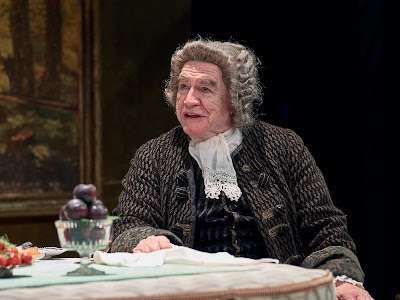Prince Edward Theatre, London
****
Written by James Graham
Directed by Rupert Goold
 |
| The cast of Dear England |
When the National Theatre staged James Graham’s Dear England in the Olivier earlier this year, it appeared to herald a flood of stage plays about the beautiful game. Had the drama on the pitch become fair game for the dramatist’s pen? Not exactly. In fact the wealth of dramas at the Edinburgh Fringe and beyond seemed to document the seismic shift in how soccer is managed, supported and perceived in this country. The seeds of this change are explored in Graham’s play, which observes the first years of Gareth Southgate’s tenure as England manager, which following universal critical acclaim now transfers to the Prince Edward in the West End.
Perennial nice-guy, Southgate is given the impossible role of manager following a shake-up at executive level. He is haunted and constantly reminded of his penalty failure at the Euros quarter final in 1996 but accepts the role on the condition that some changes are brought in with the training. Southgate has realised that despite excellent talented players through the decades, England had yet triumph on the world stage since 1966. In searching for a different approach, he enlists Dr Pippa Grange (Dervla Kirwan taking over from Gina McKee in this transfer), a successful psychotherapist who endeavours to help the young team face up to their fears and feelings. Most people are sceptical at this point, but gradually Grange breaks through and nurtures trust and comradeship within the team. What is more important is that England becomes more and more successful, albeit without actually winning a match. But Southgate is playing the long game. Before England can win, they need to learn how to lose.
Graham's drama, while ostensibly about football, is in fact a state-of-the-nation play. Its backdrop shows a country struggling with its identity, suffering governmental chaos and desperately in need of unification. Woven through with comic moments and the high drama on the pitch, there are episodes of soul-searching poignancy, as the young players address their fears and learn to bond. At the centre of all this is Southgate, played by a revelatory Joseph Fiennes, whose post-Covid open letter to the nation - Dear England - called upon the supporters to remember that the players are fans too, and that there is no place for racism when we are all aiming for the same result.
Directed by Rupert Goold, Dear England takes on an epic status. Es Devlin's clever set design, dominated by a giant illuminated stadium halo, is a rhapsody of digital projection and old-school scenery shifting. It's the first time in recent memory that the Prince Edward has played host to a straight play, but Goold's production has all the drama, choreography and spectacle of major musical - just no songs - save for snatches of Bittersweet Symphony, Vindaloo and Sweet Caroline.
Movement directors Ellen Kane and Hannes Langolf add to the drama by creating gripping physical scenes that represent everything from training to penalty shoot-outs with a remarkably limber cast playing the team. Part of the joy in this production is watching the characters unfold, whether it's Darragh Hand as Marcus Rashford, embracing this opportunity to give something back to the community or Will Close as an adorably hesitant Harry Kane, gradually learning to accept his role as team captain. There's excellent support too from Paul Thornley as coach Mike Webster, who primarily stands against Southgate's 'touchy-feely' approach but reluctantly warms to the burgeoning team spirit it engenders.
Dear England is a sharply designed, feel-good production that captures the spirit of reform that Southgate has initiated. There's no doubt it will likely attract - and rightly so - a whole new audience to the West End. As such, this might be one of the most important London transfers since Declan Rice moved from West Ham to Arsenal.
Reviewed by Paul Vale
Booking until 13th January 2024
Photo credit: Marc Brenner


.jpg)
.png)

%20and%20The%20Witches%20company%20at%20the%20National%20Theatre.%20Credits-%20Marc%20Brenner_8822.jpg)





%20and%20Kenneth%20Branagh%20(Lear)%20for%20the%20Kenneth%20Branagh%20Theatre%20Company's%20King%20Lear%20at%20Wyndham's%20Theatre%20-%20photo%20by%20Johan%20Persson.jpg)



_%20Credit%20-%20Marc%20Brenner_%202046.jpg)

,%20Keir%20Ogilvy%20(Boy)%20in%20The%20Ocean%20at%20the%20End%20of%20the%20Lane.%20c.%20Brinkhoff-Moegenburg.JPG)

